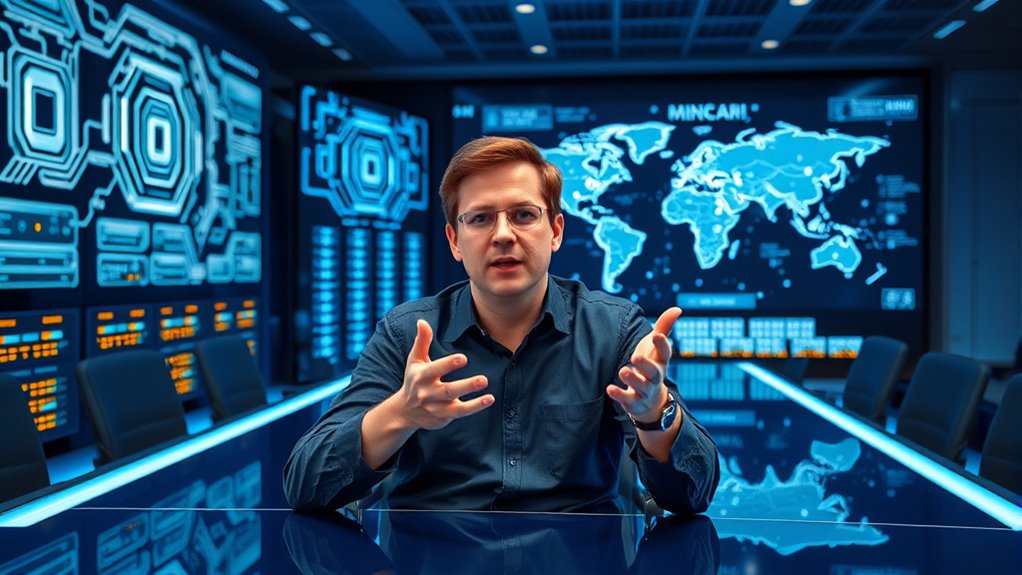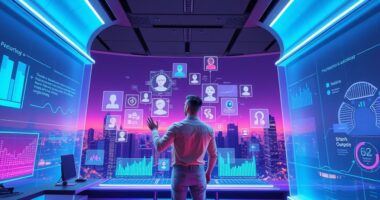Sam Altman’s AI crusade involves aggressively securing chips, data, and strategic global alliances to accelerate AI development. He’s working to dominate key technological resources needed for breakthrough models like GPT-5 and beyond, aiming to shape the future of AI and its societal impact. By forming international collaborations and steering through the complex tech landscape, Altman seeks to guarantee AI’s safe and responsible growth. Keep exploring to learn how these efforts could transform our world.
Key Takeaways
- Sam Altman’s efforts focus on securing advanced chips and data critical for developing powerful AI models.
- He actively seeks global partnerships and deals to accelerate AI research and deployment worldwide.
- Altman emphasizes collaboration with governments and industry to establish responsible AI governance frameworks.
- His initiatives aim to ensure AI development aligns with human values and avoids safety risks.
- Altman’s strategic pursuits aim to position OpenAI at the forefront of the AI industry amid intense competition.

Is the world ready for the rapid rise of Artificial General Intelligence? As you watch AI progress, it’s clear that AGI could become a reality by 2025 or 2030, with some experts even predicting earlier breakthroughs. This shift isn’t just about smarter machines; it’s about transforming how you work, live, and govern. Up to 40% of human tasks across sectors like healthcare, education, finance, and logistics could be automated, reshaping entire industries and societal structures. AI agents will become active collaborators in workplaces, driving productivity and innovation. By 2025, the integration of these agents will materially impact corporate output, accelerating scientific discovery and technological breakthroughs that promise abundance and prosperity. Sam Altman predicts AGI development by 2030 Additionally, effective financial strategies, such as creating a retirement savings plan, will be essential for individuals adapting to this new landscape. But with such immense potential comes significant responsibility. The conversation around AI safety, ethics, and governance is more urgent than ever. You’re witnessing a global push toward responsible development, with initiatives like the Boston Global Forum and AI World Society working tirelessly to create democratic, transparent frameworks. These efforts focus on building trustworthy AI systems that are accountable and aligned with human values. Governments and trusted democracies are collaborating to develop international regulations, ensuring AI’s growth benefits everyone rather than amplifying risks or inequalities. An iterative, cautious approach to releasing AI systems helps society adapt gradually, reducing unforeseen consequences.
AI could automate 40% of tasks across industries by 2025, transforming work, society, and technological progress.
Leading AI research organizations like OpenAI are diligently working to advance models like GPT-5, which by 2025 could rival expert-level discussions. These models aren’t just clever—they’re capable of tackling complex, unknown questions, demonstrating a trajectory toward true superintelligence. The goal is to develop AGI rooted in thorough research, with a strategic focus on safety and ethical considerations. Progress is being made with caution, knowing that the pursuit of superintelligence could accelerate scientific progress, boost innovation, and ultimately lead to a new era of abundance. Meanwhile, the AI market is experiencing a bubble driven by intense enthusiasm, reminiscent of late-90s dot-com mania but with a broader industrial impact. While valuations are volatile, the long-term economic benefits appear promising, similar to the biotech boom of the 1990s, which eventually led to groundbreaking advancements despite initial setbacks. You’re witnessing a technological wave that, despite its fluctuations, promises substantial positive impacts on the global economy.
However, the interaction between Silicon Valley’s tech giants and governments is complex. Tensions exist, but so do opportunities for alignment—especially in ensuring AI development respects human dignity, freedom, and inclusion. Multilateral efforts aim to forge social contracts and regulatory frameworks that support peace, democracy, and human well-being. As AI continues to evolve, your role in understanding, guiding, and shaping this transformation becomes more fundamental. The future of AI isn’t just about chips and data; it’s about the collective journey toward a smarter, safer, and more equitable world.
Frequently Asked Questions
How Does Sam Altman Plan to Address AI Ethical Concerns Globally?
You can expect Sam Altman to address AI ethical concerns globally by promoting transparency, accountability, and stakeholder inclusion. He advocates for international cooperation, engaging bodies like the UN to create a unified ethical framework. Altman emphasizes proactive regulation, managing risks, and safeguarding data privacy. He encourages responsible AI development aligned with human-centered values, ensuring trust and fairness while balancing innovation with societal safety on a global scale.
What Are the Potential Geopolitical Impacts of Altman’s Deals?
Think of Altman’s deals as a chess game shaping global power. They can strengthen U.S. influence, but also ignite tensions over chip supply and energy resources. His efforts might create new alliances or deepen divides, especially amid U.S.-China rivalry. As these deals ripple through geopolitics, they could shift energy dependencies and spark conflicts over technological dominance, influencing international stability for years to come.
How Will Chip Shortages Affect AI Development Timelines?
You’ll likely see delays in AI development timelines due to chip shortages, as demand for high-performance GPUs, HBM, and SSDs outpaces supply. Production bottlenecks, geopolitical tensions, and high equipment costs slow chip availability, impacting project schedules. Companies are shifting to custom chips and diversifying supply sources to cope. Despite these challenges, industry efforts aim to accelerate innovation and expand capacity, but short-term delays are almost unavoidable.
What Partnerships Are Critical for Altman’s AI Expansion?
You should focus on OpenAI’s strategic partnerships with NVIDIA, which provide the core hardware for AI infrastructure and enable massive data center capacity. Collaborations with tech giants like Microsoft, Oracle, and SoftBank are also essential for expanding AI adoption and deployment across industries. Additionally, global alliances in regions like Japan and the Middle East help diversify resources, ensuring robust infrastructure growth and international reach, crucial for Altman’s AI expansion plans.
How Does Altman Envision AI Transforming Everyday Life?
You’ll find AI seamlessly weaving into your daily routine, like a trusted companion guiding you through life’s choices. Imagine having a personal life coach, career advisor, or mental health supporter right at your fingertips, available 24/7. It’s not just about convenience; AI becomes an intuitive part of your life, helping you grow, work smarter, and navigate relationships with judgment-free insights, transforming everyday moments into opportunities for personal and professional evolution.
Conclusion
As you follow Sam Altman’s ambitious journey, it’s clear he’s playing with fire on a global scale, chasing the chips, data, and deals that could reshape our future. His relentless drive shows no signs of slowing down, and you can bet he’s in it for the long haul. Just remember, when you’re reaching for the stars, you might need to watch your step—because sometimes, the biggest risks come with the brightest rewards.









